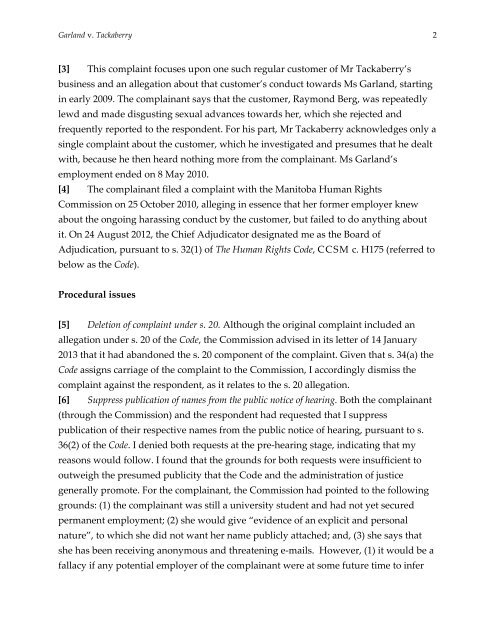Emily Garland v Scott Tackaberry operating as Grape and Grain
Emily Garland v Scott Tackaberry operating as Grape and Grain
Emily Garland v Scott Tackaberry operating as Grape and Grain
You also want an ePaper? Increase the reach of your titles
YUMPU automatically turns print PDFs into web optimized ePapers that Google loves.
<strong>Garl<strong>and</strong></strong> v. <strong>Tackaberry</strong><br />
[3] This complaint focuses upon one such regular customer of Mr <strong>Tackaberry</strong>’s<br />
business <strong>and</strong> an allegation about that customer’s conduct towards Ms <strong>Garl<strong>and</strong></strong>, starting<br />
in early 2009. The complainant says that the customer, Raymond Berg, w<strong>as</strong> repeatedly<br />
lewd <strong>and</strong> made disgusting sexual advances towards her, which she rejected <strong>and</strong><br />
frequently reported to the respondent. For his part, Mr <strong>Tackaberry</strong> acknowledges only a<br />
single complaint about the customer, which he investigated <strong>and</strong> presumes that he dealt<br />
with, because he then heard nothing more from the complainant. Ms <strong>Garl<strong>and</strong></strong>’s<br />
employment ended on 8 May 2010.<br />
[4] The complainant filed a complaint with the Manitoba Human Rights<br />
Commission on 25 October 2010, alleging in essence that her former employer knew<br />
about the ongoing har<strong>as</strong>sing conduct by the customer, but failed to do anything about<br />
it. On 24 August 2012, the Chief Adjudicator designated me <strong>as</strong> the Board of<br />
Adjudication, pursuant to s. 32(1) of The Human Rights Code, CCSM c. H175 (referred to<br />
below <strong>as</strong> the Code).<br />
Procedural issues<br />
[5] Deletion of complaint under s. 20. Although the original complaint included an<br />
allegation under s. 20 of the Code, the Commission advised in its letter of 14 January<br />
2013 that it had ab<strong>and</strong>oned the s. 20 component of the complaint. Given that s. 34(a) the<br />
Code <strong>as</strong>signs carriage of the complaint to the Commission, I accordingly dismiss the<br />
complaint against the respondent, <strong>as</strong> it relates to the s. 20 allegation.<br />
[6] Suppress publication of names from the public notice of hearing. Both the complainant<br />
(through the Commission) <strong>and</strong> the respondent had requested that I suppress<br />
publication of their respective names from the public notice of hearing, pursuant to s.<br />
36(2) of the Code. I denied both requests at the pre‐hearing stage, indicating that my<br />
re<strong>as</strong>ons would follow. I found that the grounds for both requests were insufficient to<br />
outweigh the presumed publicity that the Code <strong>and</strong> the administration of justice<br />
generally promote. For the complainant, the Commission had pointed to the following<br />
grounds: (1) the complainant w<strong>as</strong> still a university student <strong>and</strong> had not yet secured<br />
permanent employment; (2) she would give “evidence of an explicit <strong>and</strong> personal<br />
nature”, to which she did not want her name publicly attached; <strong>and</strong>, (3) she says that<br />
she h<strong>as</strong> been receiving anonymous <strong>and</strong> threatening e‐mails. However, (1) it would be a<br />
fallacy if any potential employer of the complainant were at some future time to infer<br />
2


